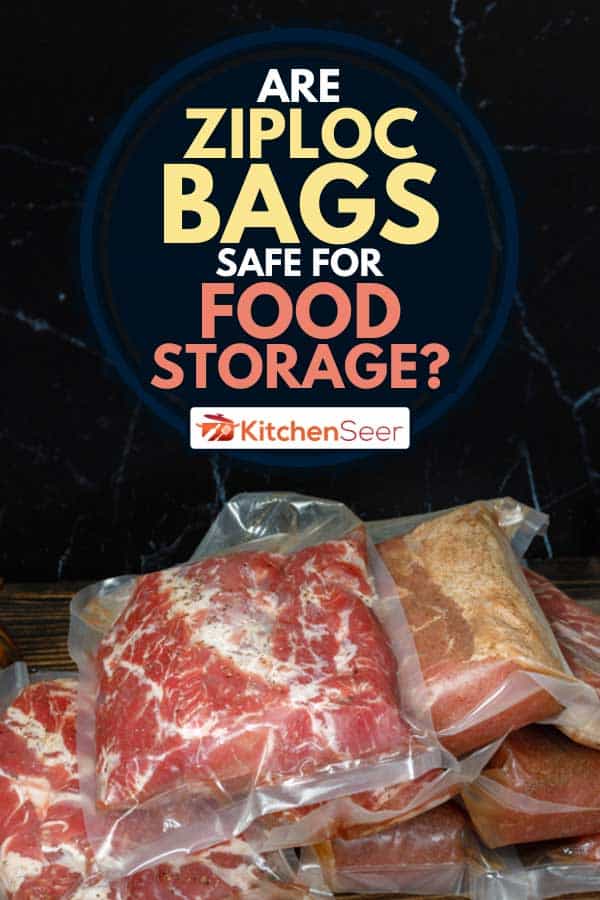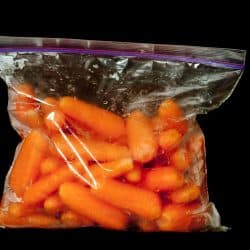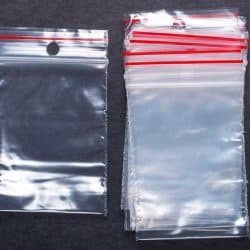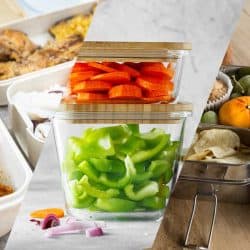For decades, millions of students and employees have relied on SC Johnson’s Ziploc bags to keep their lunches fresh. But does that mean Ziploc bags are suitable for long-term food storage? If you’ve wondered whether Ziploc bags are freezer-safe, then you’ve got to check out the research we’ve done on this topic.
According to the FDA, Ziploc freezer-approved bags are safe for long-term food storage. However, before you use Ziploc bags for food storage, please consider these pros and cons:
Ziploc Bags Pros
- Unlike containers, Ziploc bags seal around your food, which means they take up less space in the fridge.
- Ziploc bags are BPA-free.
- Storing foods in Ziploc bags extends their shelf-life beyond the original packaging.
- Ziploc bags are affordable, easy to use, and readily available.
Ziploc Bags Cons
- Ziploc bags are not 100 percent airtight.
- Ziploc bags aren’t as environmentally friendly as reusable glass containers.
Do you still have questions about storing food in Ziploc bags? Please keep reading all of the “fresh” tips below.

Can You Use Ziploc Bags For Food Storage?
Yes, you can store food in Ziploc bags and place them in the fridge or freezer. Although Ziploc bags aren’t 100 percent airtight, they are FDA-approved for long-term storage.
Here are a few other safety considerations to think about if you want to use Ziploc plastic bags to store food.
Do Ziploc Bags Contain BPA?
In recent years, health experts have raised concerns over the compound bisphenol A (BPA) often found in plastics. Although there’s a lot we still don’t understand about BPA, some studies suggest it could mess with our hormone levels.
To protect its customers, SC Johnson promises to use BPA-free plastics in all Ziploc products. The company also claims it has met all of the FDA’s requirements for food storage safety.
Although Ziploc bags are BPA-free, that doesn’t mean you should dump these bags in boiling water. For more info on this “burning” issue, be sure to read this previous KitchenSeer post.
Can You Store Meat In Ziploc Bags?
Placing meat in a well-sealed, freezer-approved Ziploc bag is a great way to preserve your meats for the long haul. The US Department of Agriculture says it’s safe to store meats in the freezer indefinitely. All you have to do is ensure your freezer stays at a constant 0° F.
Although meats appropriately stored in the freezer are technically good forever, that doesn’t mean they’ll always be tasty. Indeed, most meats lose their flavor after about three months in the freezer. Of course, you should always inspect your meat for freezer burn.
Bonus tip: you could marinate your favorite meats, fish, or poultry in Ziploc bags and leave them in the fridge overnight. This is a great way to prepare delicious dinners on busy weekdays.
Can Ziploc Bags Hold Liquids?
Although you might not associate Ziploc bags with sauces, they can safely hold liquids like tomato sauce and gravy. America’s" target="_self" rel="noopener noreferrer"> Test Kitchen threw sauce-filled plastic bags around their studio to test each brand’s seals. Out of all the brands in this trial, Ziploc performed the best.
Just be extra sure the edges of your Ziploc bags are firm and free from tears. It’s especially important you use Ziploc’s heavy-duty freezer bags to minimize the risk of sauce spillage.
Find out more on this Amazon link.
If you don’t feel comfortable using Ziploc bags for liquids, you might want to consider using freezer-safe plastic or glass containers. To learn more about plastic, steel, and glass containers, please read through this KitchenSeer post.
How Long Do Ziploc Bags Keep Food Fresh?
Honestly, it’s difficult to determine how long Ziploc bags keep food fresh. Every food spoils at a different rate, and some pantry staples have an indefinite life span (e.g., white rice). Other factors that influence food spoilage include humidity, whether your food is raw or cooked, and where you store your Ziploc bags.
If you need specific numbers, then the USDA suggests storing uncooked meats for a maximum of four months in the freezer. Cooked meats, however, shouldn’t be kept in the freezer for longer than three months.
In the fridge, most meats only last a few days, even in Ziploc bags. You should always follow the official expiration date on meat products as a guide if you’re storing them in the refrigerator.
As for produce, there’s a great deal of variance depending on what you buy. Leafy greens only last a few days, while some fruits like pomegranates could last months in the fridge. For a more comprehensive guide to storing produce, take a look at this “cheat sheet.”
Lastly, if you’re storing dry snacks on the counter, you should expect them to last a few weeks past the manufacturer’s “sell by” date. Some people say they’ve been able to keep their tortilla chips crisp for as long as three weeks after opening the original packaging.
Please keep in mind these storage suggestions are not written in stone. Always inspect your food for signs of spoilage, mold, or freezer burn before you decide to cook it.
You should also remember that Ziploc bags are not completely airtight. To get the most air out of your Ziploc bags, you need to read through this KitchenSeer tip.
Lastly, you could read SC Johnson’s official guide to food storage on this webpage.
What Ziploc Bag Is Best For Food Storage?
Now that you’ve decided whether to use Ziploc bags for food storage, you’ve got to determine which of SC Johnson’s many products to buy. Here are a few primers on picking the perfect Ziploc bag.
What’s The Difference Between Ziploc Storage And Freezer Bags?
Compared with standard Ziploc storage bags, freezer-approved bags have a thicker plastic coating. This extra-durable material not only prevents air from getting in, but it also reduces the risk of tears. So, even if you’re storing bone-in meats in the freezer, these Ziploc bags are fairly tear-resistant.
Although standard Ziploc bags aren’t designed for the freezer, that doesn’t mean you can’t store food in them. Just bear in mind these bags are thinner, so there’s a higher chance of tearing and freezer burn.
What Size Do Ziploc Bags Come In?
A nice feature of the Ziploc brand is that it offers a wide variety of sizes. Whether you want to store a few snacks or freeze a steak, you can find the size you’re looking for in Ziploc’s catalog.
First off, Ziploc offers a small 6 ½ in x 3 ¼ in bag size. These tiny bags are best suited for your family’s favorite snacks like pretzels, chips, and granola. Additionally, you could safely store fresh fruit and veggies in these cute baggies.
Click this Amazon link for more info.
Next up, there’s Ziploc’s quart-sized standard bag. Each of these bags measures 7 in x 7 7/16 in, making them one of the most versatile options on the market. SC Johnson recommends storing veggies, fruit, or leftovers in these bags, but they’re also great for packing lunches.
Click this Amazon link for more details.
If you need extra space for your salami sandwich, you should check out Ziploc’s sandwich-sized bags. These plastic bags measure 7 in x 8 in rather than 7 in x 7 7/16 in. Although it might not seem like a lot of extra space, you’ll be amazed at how much of a difference that 9/16 inch makes!
Find out more on this Amazon link.
For those who want to store big items in the freezer, check out these freezer-approved gallon-sized bags. Each of these freezer-approved bags measures 10 9/16 in x 10 ¾ in and comes with Ziploc’s famous triple-seal technology.
Click this Amazon link for more info.
Not Airtight, But Alright – Ziploc Bags For Food Storage
Although Ziploc bags are safe for food storage, please remember they are not 100 percent airtight. As always, please thoroughly inspect your food for mold or freezer burn before cooking it. Also, if you’d like to learn more about the benefits of airtight containers, we recommend reading through this previous KitchenSeer post.







![A bundle of dill inside a Ziploc bag, Are Ziploc Bags Airtight? [And how to make them so]](https://kitchenseer.com/wp-content/uploads/2020/07/A-bundle-of-dill-sealed-inside-a-ziploc-bag-250x250.jpg)

![Healthy food for kids concepts: well balanced school lunch box shot on blue table. School supplies are around the lunch box, How To Seal Plastic Food Containers [4 Cool Tricks!]](https://kitchenseer.com/wp-content/uploads/2020/12/Healthy-food-for-kids-concepts-well-balanced-school-lunch-box-shot-on-blue-table.-School-supplies-are-around-the-lunch-box-250x250.jpg)

